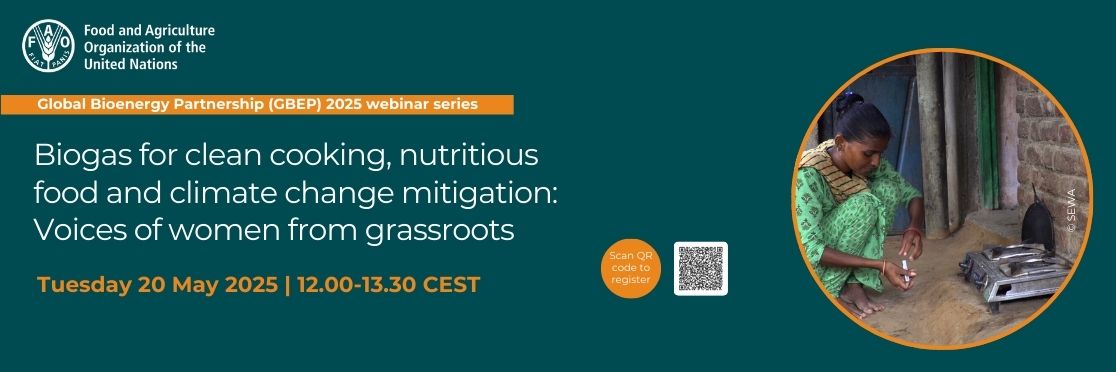Biogas for clean cooking, nutritious food and climate change mitigation: Voices of women from grassroots
Part of Global Bioenergy Partnership (GBEP) 2025 webinar series
Virtual Event, 20/05/2025

©SEWA
Biogas can provide rural communities with clean, affordable energy for cooking and lighting while improving health by reducing indoor air pollution. It can also enhance livelihoods by saving time, lowering fuel costs, and producing organic fertilizer that boosts agricultural productivity.
In rural India, the Self Employed Women’s Association (SEWA), is promoting biogas as a clean, affordable, and sustainable energy solution for rural households, especially among women engaged in agriculture and animal husbandry.
Join us for an inspiring webinar on Tuesday 20 May 12:00-13:00 CEST. Grassroots women willshare how biogas is transforming their villages – boosting food security, protecting health and greening their communities. Hear firsthand stories of success, smart strategies for introducing anaerobic digesters, and honest reflections on the challenges that still remain.
This webinar is part of the 2025 Global Bioenergy Partnership (GBEP) webinar series, as part of the thematic area ‘Biogas and biomethane’. It is organized by FAO in the context of the Global Bioenergy Partnership's programme of work.
Agenda
Introduction to webinar | Tiziana Pirelli, FAO/GBEP |
Biogas in India: FAO’s perspective and contribution | Mr. Bhimashankar Shetkar, Chief Operating Officer, NDDB Mrida |
Rural innovators: From animal husbandry to biogas leadership | Ramilaben Somabhai Parmar, SEWA |
Fueling food security: A biogas journey from Maharashtra | Indrabai Chandanshing Dumale, SEWA |
My village, my pride: building a greener future with biogas | Hiralben Solanki, SEWA |
Interactive discussion and Q&A | Moderated by Constance Miller, FAO/GBEP |
More about SEWA
The Self Employed Women’s Association (SEWA) is a grassroots movement and trade union in India that organizes women workers in the informal economy to achieve their rights and improve their livelihoods. Founded in 1972 by Ela Bhatt, SEWA empowers women through collective action, access to financial services, skill-building, and advocacy. With a membership of over two million women across several Indian states, SEWA focuses on self-reliance and the integration of social and economic development, enabling women to become both economically independent and socially secure. By supporting the construction and maintenance of household biogas units, SEWA helps women turn cattle waste into a valuable energy source for cooking, thereby reducing dependency on firewood and improving health outcomes. This initiative not only enhances food and energy security but also creates opportunities for local employment through the training of women as biogas masons and technicians. SEWA’s biogas work aligns with its broader mission of environmental sustainability, women's empowerment, and poverty alleviation.
